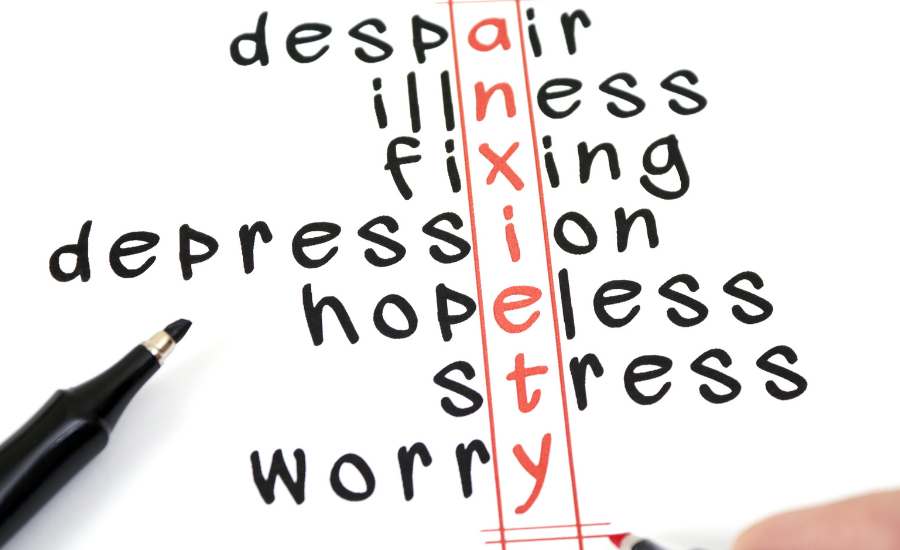From where I’m sitting, snow is covering the ground and has been there for well over a week. As someone who doesn’t like cold weather, I have been staying at home as much as possible to avoid the chill of the 20-degree weather. But what if you are staying home because of crippling anxiety?
Grief is Unpredictable
You’ve heard me say before that grief is unpredictable. It doesn’t fit in a box. It doesn’t tell you in advance when it may come. How long it will stay. Or how great or small it may be at any given time. It’s like the waves of the ocean—sometimes the waves are frequent and intense and other times, they are few and gentle.
Grief is the same. And because it is unpredictable, perhaps like the death of your loved one, your body becomes activated and your nervous system gets stuck in a fight or flight mode. There have been so many changes in your life it’s no wonder that you are experiencing anxiety.
Bereavement Anxiety is Normal
Anxiety is a normal part of the grieving process. It’s your brain’s response to something that is fearful. Your life has changed in an instant! And you are left wondering how to cope with loss and how to move forward in life all at the same time.
There are worries about the future. There are worries about today. There are fears about the grieving process itself. No one wants to experience pain, but feeling your feelings is what helps to move you through them. As you start to feel them though, you become afraid that they may overwhelm you and if you start feeling them, you may not stop! And many times, you have to rethink the things that you thought were true about life because you are realizing that even those who love God experience painful things. Bad things do happen to good people.
So, what can you do if anxiety is walking alongside you on your grief journey?
Five Things You Can Do to Help Your Anxiety
Acknowledge It
First, acknowledge that you are experiencing anxiety. When we are afraid of certain emotions, we can be afraid to acknowledge them because we think that the feeling will become larger. However, research shows that when we name it, we tame it! Naming our emotions helps to calm the brain.
Pray About It
Second, pray. Tell God what you are feeling. Ask for His help in overcoming the anxiety you are feeling. He says that He is close to the brokenhearted and saves those who are crushed in spirit (Psalm 34:18). When you are brokenhearted and anxious, God wants you to know that He is close – comforting you!
Normalize It
Third, normalize the anxiety. Sometimes Christians can spend so much time telling themselves that they shouldn’t feel anxious, instead of recognizing and acknowledging reality. You can only begin to do the work when you acknowledge what is because the “shoulds” and “should nots” are irrelevant when you are in the midst of it. Experiencing anxiety in bereavement is normal.
Check the Story Around It
Fourth, check out the story you are telling yourself. Many times, you may be telling yourself that your grief is simply awful—and it is—but what if you told yourself that the grief is awful, but that you can move forward with it and allow grace and truth to do its work over time? You will need others in your life to bounce your story off of and to receive feedback. Also, writing your grief story can be a benefit as well. Check out the free grief journal with prompts here –> Healing from Within: How to Begin Writing Your Grief Story.
Confront It
Fifth, don’t avoid your anxiety triggers altogether. Make a plan for how you will confront them. Maybe going to your favorite restaurant for the first time without your loved one should be done with a close friend who understands that you may need to sit quietly throughout the meal and who doesn’t try to bright-side what you are feeling. Avoiding your triggers may give you immediate relief, but eventually they can become a stronghold. Remember, God enables you to do hard things (Phil. 4:13). And each time you do a hard thing and survive, you increase your ability to cope with it. If this life was easy, God wouldn’t tell us to fight for our faith or hold tightly to what we believe. Sometimes, we simply have to do hard things, but we never have to do them alone (Deut. 31:8).
Self-care
And of course, a part of all good grief is self-care no matter what you are experiencing. Get out in nature, take long walks and quiet baths, and watch that funny movie! Sometimes, a part of self-care is going to your doctor or therapist even if it’s simply to check in and hear that you are on the path toward healing—which is never getting over grief, but learning to live with it in a way that is manageable. If you do find it’s not manageable, definitely make that appointment! Don’t go another day just hoping tomorrow will better. You must do something different today for tomorrow to be better, but it does take time. There is no magic pill, no snapping of the fingers to change it all instantly. However, when you make the best use of your time, your grief will change and you will change too. You become wiser and more compassionate! Less judgmental and letting go of those things that are not important.
Know Jesus with You
Friend, grief is a battle, and it is brutal at times, but greater is He who is in you (I John 4:4)! He gives you the wisdom and courage to know when He is calling you to fight and when He is calling you to be still and let Him fight for you (Ex. 14:14)! Jesus understands when you have no energy and sometimes no will to fight. Remember, what He did when His friend Lazarus died—He wept with Martha and Mary and their friends. He weeps with you too!
God is in Control
As He calls you to hold on tightly, you can also rest in His loving arms because that’s exactly where you fall when you can no longer hold on. This is where you are to just be still and know that He is God (Ps. 46:10)—the one who has all things under His control whether or not you understand it.



Leave A Comment